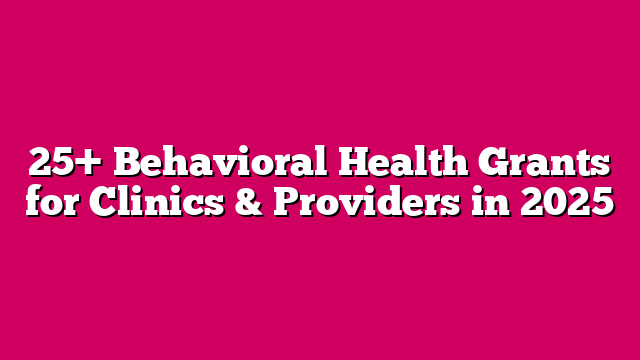Have your progress notes written for you automatically
Behavioral health clinics and providers play a critical role in addressing mental health and substance use disorders, however funding for these organizations can be challenging. Since not all individuals have insurance coverage for these services, it becomes critical for organizations to subsidize cost to ensure they are accessible to the community.
Securing funding can help organizations expand services, improve access, and enhance care quality, and grants are a great way to petition for additional money to go towards programming. This guide gives clinics and providers a list of grant options they can apply to which includes federal, state and private funders.
- The Substance Abuse and Mental Health Services Administration (SAMHSA) Grants: These are federal funding opportunities. These grants fund a range of programs, including prevention, treatment, and recovery programs for mental health and substance use disorders. Examples of programs under SAMHSA include the Community Mental Health Services Block Grant, which funds state-level mental health services, and the Substance Abuse Prevention and Treatment Block Grant, which focuses on addressing substance use disorders.
Also, Certified Community Behavioral Health Clinics (CCBHC) Expansion Grants aim to help clinics enhance service delivery and expand their capacity to meet community needs. These grants play a vital role in strengthening behavioral health infrastructure and improving access to quality care.
- The Health Resources and Services Administration (HRSA) Behavioral Health Workforce Grants: Focuses on addressing the shortage of skilled professionals in the behavioral health field, particularly in underserved areas. These grants include programs like the Behavioral Health Workforce Education and Training (BHWET) Program and the Rural Health Care Services Outreach Program. They aim to provide funding for education and training initiatives that equip individuals with the necessary skills to work in behavioral health settings. By strengthening the workforce, these grants help clinics and providers expand their capacity to deliver critical mental health and substance use disorder services, especially in rural or underserved regions.
- The Department of Justice (DOJ) Grants provide funding to improve how behavioral health services are integrated into the justice system. For example, the Justice and Mental Health Collaboration Program helps foster cooperation between law enforcement and mental health professionals, enhancing responses to individuals with mental health needs within the criminal justice system. Similarly, the Opioid Affected Youth Initiative focuses on addressing the specific needs of youth impacted by the opioid crisis, supporting prevention and intervention strategies. These grants aim to bridge gaps between mental health services and justice processes, ultimately contributing to more effective and humane systems of care for vulnerable populations.
- State Block Grants for Behavioral Health are a funding mechanism provided by the federal government through the Substance Abuse and Mental Health Services Administration (SAMHSA) but administered at the state level. These grants are crucial for supporting state-run programs that address mental health and substance use disorders. They allow states the flexibility to design and implement programs tailored to their specific community needs, ensuring that resources are allocated where they are most needed. The funds typically support a broad range of services, including prevention initiatives, treatment programs, and recovery support systems, aimed at improving access and outcomes in behavioral health care.
- Medicaid Waiver and Incentive Programs provide funding opportunities for states to develop and implement innovative care delivery models for behavioral health. These programs often focus on enhancing services like behavioral health homes, which integrate primary and mental health care, and crisis intervention services that provide immediate support for individuals in distress. By offering states flexibility to design tailored solutions, these initiatives aim to improve care access and quality while addressing the specific needs of local communities.
- The Behavioral Health Partnership Innovation Funds are grant opportunities designed to foster collaboration and innovation among behavioral health providers, community organizations, and other stakeholders. These funds typically support projects that develop new models of care, enhance service delivery, or address specific behavioral health challenges through partnerships. By emphasizing teamwork and creative solutions, these grants help expand access to mental health and substance use disorder services, particularly in underserved communities.
- The Robert Wood Johnson Foundation (RWJF) is a private foundation that focuses on funding initiatives aimed at addressing social determinants of health and improving community mental health. Their grants typically support innovative programs that address systemic issues affecting mental health, such as housing, education, and access to care. By targeting these root causes, the RWJF seeks to create long-term, sustainable improvements in behavioral health outcomes.
- The Kresge Foundation’s Health Program provides funding aimed at supporting community-based behavioral health providers. This initiative focuses on helping organizations enhance their ability to deliver mental health and substance use disorder services, particularly in underserved areas. The grants are open to nonprofits and public agencies, allowing these organizations to address critical gaps in care, improve service delivery infrastructure, and implement innovative approaches to community health challenges.
- The MacArthur Foundation's Mental Health Initiatives refer to a series of funding programs and projects designed to support mental health research, improve mental health care, and promote policy reform. These initiatives are part of the foundation's broader commitment to social justice and health equity. The foundation has historically worked to reduce the stigma around mental illness, improve access to mental health services, and foster better understanding of mental health conditions.
- Well Being Trust is a national foundation focused on advancing mental, social, and spiritual health. They works to improve overall well-being by tackling mental health issues, promoting prevention, and addressing the root causes of poor health in communities. Its goal is to help communities thrive by creating a more integrated and equitable approach to well-being, emphasizing the importance of mental health alongside physical health.
- The National Council for Mental Wellbeing is a prominent organization that advocates for and supports mental health and substance use services in the U.S. It provides a variety of grants and funding opportunities to support organizations, initiatives, and projects aimed at improving mental health and wellness, particularly for vulnerable populations. These grants are part of the National Council’s commitment to advancing mental health care, substance use treatment, and overall well-being.
- The National Institute of Mental Health (NIMH), part of the U.S. National Institutes of Health (NIH), is the leading federal agency for mental health research. NIMH provides a range of research grants to support studies aimed at advancing the understanding, diagnosis, and treatment of mental health disorders. These grants are typically awarded to universities, research institutions, and sometimes individual researchers in order to fund innovative scientific research that contributes to the understanding of mental illnesses and improves mental health care.
- The American Psychiatric Association (APA) Foundation provides grants and funding opportunities to support initiatives aimed at improving mental health care, advancing psychiatric research, and addressing mental health issues at the community level. The APA Foundation is the philanthropic arm of the American Psychiatric Association (APA), which is a leading professional organization for psychiatrists. The foundation’s grants support projects that promote the well-being of individuals and communities through better mental health services, public education, and research.
- The Blue Cross Blue Shield (BCBS) Foundation offers a variety of grants aimed at improving healthcare access, health equity, and public health outcomes, particularly for underserved communities. The grants provided by the BCBS Foundation are typically focused on addressing health disparities, supporting innovation in healthcare delivery, and promoting overall wellness and prevention. These grants are generally available to nonprofits, healthcare organizations, community groups, and sometimes academic institutions working in behavioral health-related fields.
- The United Health Foundation focuses on improving the health and well-being of individuals and communities, particularly those who are underserved or facing health disparities. It provides grants to nonprofits, healthcare organizations, and community groups that are working to improve public health, promote access to mental health care, and address the social determinants of health.
- The CVS Health Foundation focuses on improving health and well-being, particularly in underserved communities, by providing grants to organizations working to address health disparities, promote preventive care, and improve access to healthcare. The foundation has a strong focus on mental health and offers grants to support initiatives that improve mental health services, reduce stigma, and increase access to care, particularly for vulnerable populations.
- Elevance Health Foundation focuses on improving health and well-being, with particular attention to underserved populations and addressing health disparities. Its mental health-related grants are designed to support initiatives that improve access to mental health services, reduce stigma, and promote mental wellness. The Anthem Foundation provides funding to nonprofit organizations, community groups, and healthcare providers working on mental health initiatives.
- The Pew Charitable Trusts is a nonprofit organization that works to improve public policy, support scientific research, and advocate for the public good. It is involved in a wide range of areas, including public health, environmental conservation, economic mobility, and public safety. In the realm of mental health and addiction, Pew Charitable Trusts provides funding and support for programs focused on improving mental health services, addressing substance use disorders, and developing evidence-based solutions to public health challenges.
- The Ford Foundation works to promote social justice and human rights with a mission to reduce poverty and inequality, and it focuses on a wide range of issues, including human rights, education, economic fairness, climate change, and health. The Ford Foundation has a strong commitment to mental health and addiction, particularly in underserved communities, and it works to address systemic barriers to accessing mental health services and supporting addiction recovery.
- The Conrad N. Hilton Foundation is a private, nonprofit organization with a mission to improve the lives of individuals living in poverty and experiencing disadvantage, with a specific focus on health, education, and human rights. One of its primary areas of focus is mental health and substance use disorders, particularly for underserved and vulnerable populations. The foundation funds innovative solutions that aim to increase access to mental health care, reduce addiction-related issues, and support people in recovery.
- The National Institute on Drug Abuse (NIDA), part of the National Institutes of Health (NIH), is a key U.S. government agency that funds and supports research into the causes, effects, prevention, and treatment of drug abuse and addiction. NIDA’s mission is to advance scientific knowledge to improve public health by reducing the impact of drug use and addiction. It offers a wide range of research grants aimed at improving the understanding of addiction and developing better prevention and treatment methods.
- The Jed Foundation (JED) is a nonprofit organization dedicated to protecting the emotional health and preventing suicide among teens and young adults, especially on college campuses. The foundation works to promote mental health awareness, create supportive environments for students, and reduce stigma associated with mental health and substance abuse. JED also focuses on building comprehensive campus mental health programs and providing resources to help students manage stress, depression, and other mental health challenges.
- The National Alliance on Mental Illness (NAMI) is one of the leading grassroots organizations in the United States that advocates for individuals affected by mental illness and promotes mental health awareness, support, and education. NAMI offers a range of grants and funding opportunities to support initiatives that improve mental health care, increase public understanding of mental health issues, and provide resources for individuals living with mental health conditions and their families.
- The Herb Alpert Foundation is dedicated to fostering creativity, supporting mental health and wellness, and promoting education, especially for underserved communities. One of the key areas of focus for the foundation is using the arts to address mental health and well-being, particularly through innovative programs that integrate creative expression into healing processes.
- The W.K. Kellogg Foundation is committed to supporting children, families, and equitable communities. It has a long history of investing in initiatives that promote the well-being of children, reduce racial inequities, and support healthy, sustainable communities.The foundation's grants focus on advancing racial equity, early childhood education, community health, family economic security, and mental health, among other areas. One of its core goals is to foster systemic change and improve social conditions that influence mental health, especially for marginalized populations.
Navigating the grant landscape can be challenging but is essential for sustaining and growing behavioral health services. These funding opportunities provide clinics and providers with resources to innovate, expand access, and improve outcomes. For the latest updates, always check the respective grant provider’s official website and consider working with grant writers to increase your chances for obtaining the grant.







